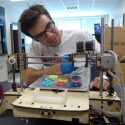Class aims to birth software companies at UW-Madison
Paul Barford, a UW–Madison professor of computer science, has a proposition, and he’s got five minutes to make it.
He’s consciously mimicking the “product pitch” that entrepreneurs make before venture capitalists, except his audience is undergraduates in a class on starting a software company.
Students enrolled in a computer science course, taught by professors Remzi Arpaci-Dusseau and Paul Barford, meet in after-class breakout sessions to discuss their class projects in the Hyrbrid Zone X inside the Wisconsin Institute for Discovery.
Photo: Bryce Richter
Time is tight, so Barford lunges ahead. “Google is earning $40 billion a year in advertising revenue, but advertisers are only interested in websites with substantial traffic,” he says. Billions of times every day, ad space is auctioned on thousands of websites. Websites with high traffic can make money.
That pretty much rules out a blog on your trip to the Grand Canyon.
But Barford has a deal, and within three minutes, the class is hanging on every word. He’s located a high-traffic website that will split the profits with students who repackage its data to make additional revenue.
This fastball pitch illustrates several key points of a class aimed at helping undergraduates create software companies: Work fast. Stress value. Innovate.
“There are a lot of bright students on this campus,” says co-teacher Remzi Arpaci-Dusseau, also a professor of computer science. “What do you do to enter this very exciting space?”
Arpaci-Dusseau says the class will focus on the mindset, techniques and multi-tasking needed to be a software entrepreneur. “The main goal is to start software companies, so students have to understand the startup process, learn to pitch ideas, and become familiar with business techniques and the commercial and legal aspects.”
“We want to give students training in the latest software development tools and techniques,” adds Barford. But the class will also explore “business and entrepreneurship ideas that are essential in order to speak the language of industry.”
Although the Wisconsin School of Business has devoted increasing attention to entrepreneurship in recent years, this will be the university’s first class devoted to the software business, says Barford, who has already started and sold Nemean Networks, a network security startup.
The class has been granted 24/7 access to offices in Hybrid Zone X in the Wisconsin Institute for Discovery (WID). While working side-by-side, students benefit from companionship and advice during the long hours needed to write code while simultaneously determining the market, sales pitch and business plan.
“Physical space is very important, and we are working with people at HzX in WID to turn the space into something that is reflective of the kind of incubation spaces you will see on the East or West Coast,” Barford says.
“This could lead to a very fertile environment for entrepreneurs that is uniquely Wisconsin. We want to create an environment that provides a framework for developing business, particularly software, that has not existed on this campus, and frankly has not existed on many other campuses.”
Paul Barford
“This class represents one in an ongoing series of experiments in HzX that aims to generate hybrids among researchers, students and entrepreneurs,” says David Krakauer, WID director. “HzX aims to amplify core UW research strengths into transformative courses and collaborations with an entrepreneurial focus.”
Madison is not Silicon Valley, but the experience of Barford and others shows that successful software startups are still possible. Comparing Madison to Silicon Valley or MIT is an unreasonable expectation, Barford says.
“Our students have significant talent, and there are amazing alumni and people on campus who are coalescing around the idea,” Barford says. “This could lead to a very fertile environment for entrepreneurs that is uniquely Wisconsin. We want to create an environment that provides a framework for developing business, particularly software, that has not existed on this campus, and frankly has not existed on many other campuses.”
The “Silicon Valley Badgers,” a group of successful Wisconsin alumni working in the epicenter of the digital world, have agreed to serve as mentors for the class, which also gets support from American Family Insurance and Facebook.
For Dan Borkus, a senior economics major, Barford’s insights about his startup have been illuminating. “It was interesting having him walk us through how to get it started, how the team launched a product and eventually was able to exit the business.”
Long hours, disappointment, and gallons of energy drinks stand between the young entrepreneurs and success, but Barford likes what he’s seen.
“I’m very pleased with the response,” he says. “They are quickly recognizing some of the basic essential elements of starting a company. These are very smart kids, and they are going to pick it up extremely quickly.”

